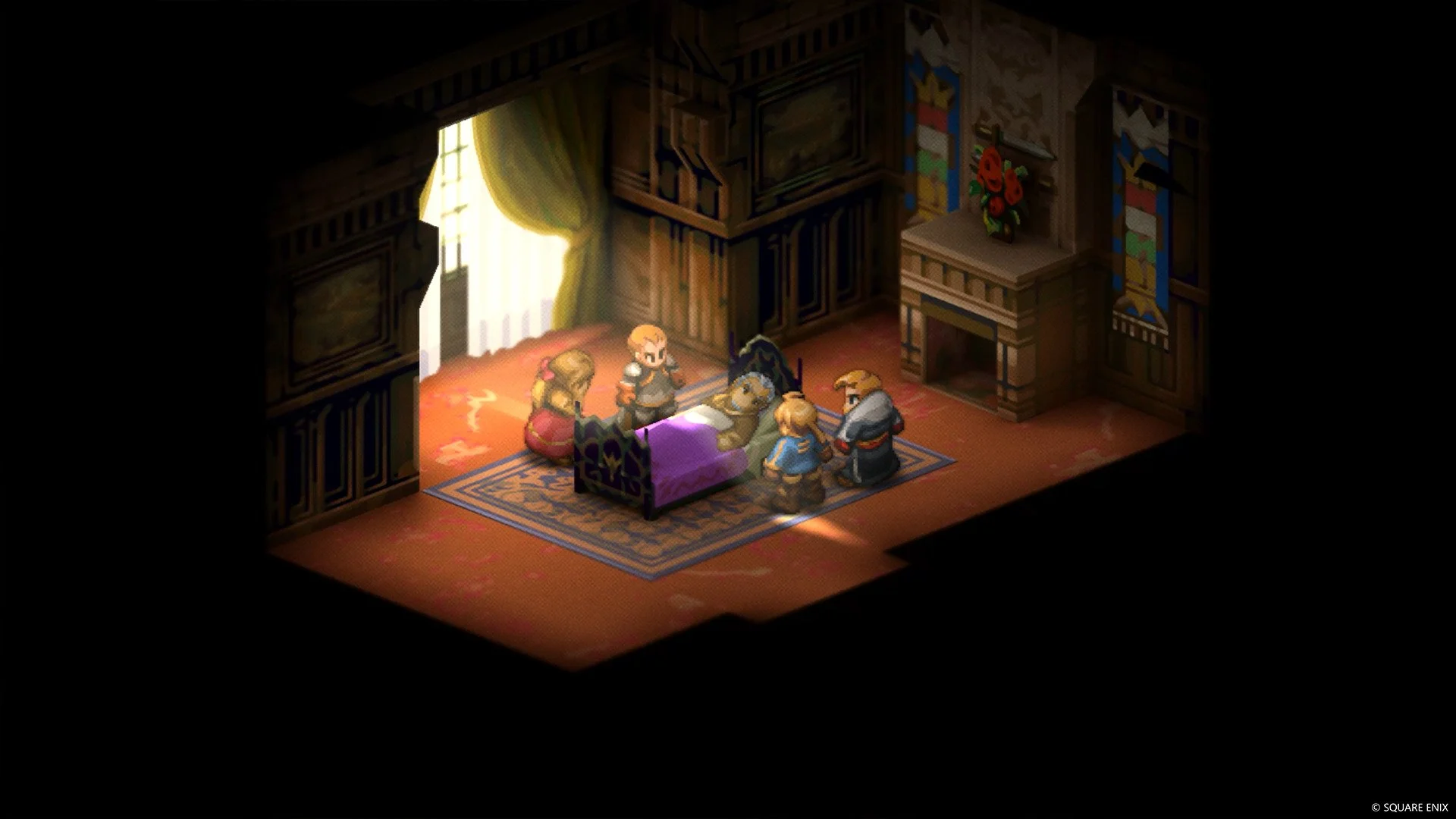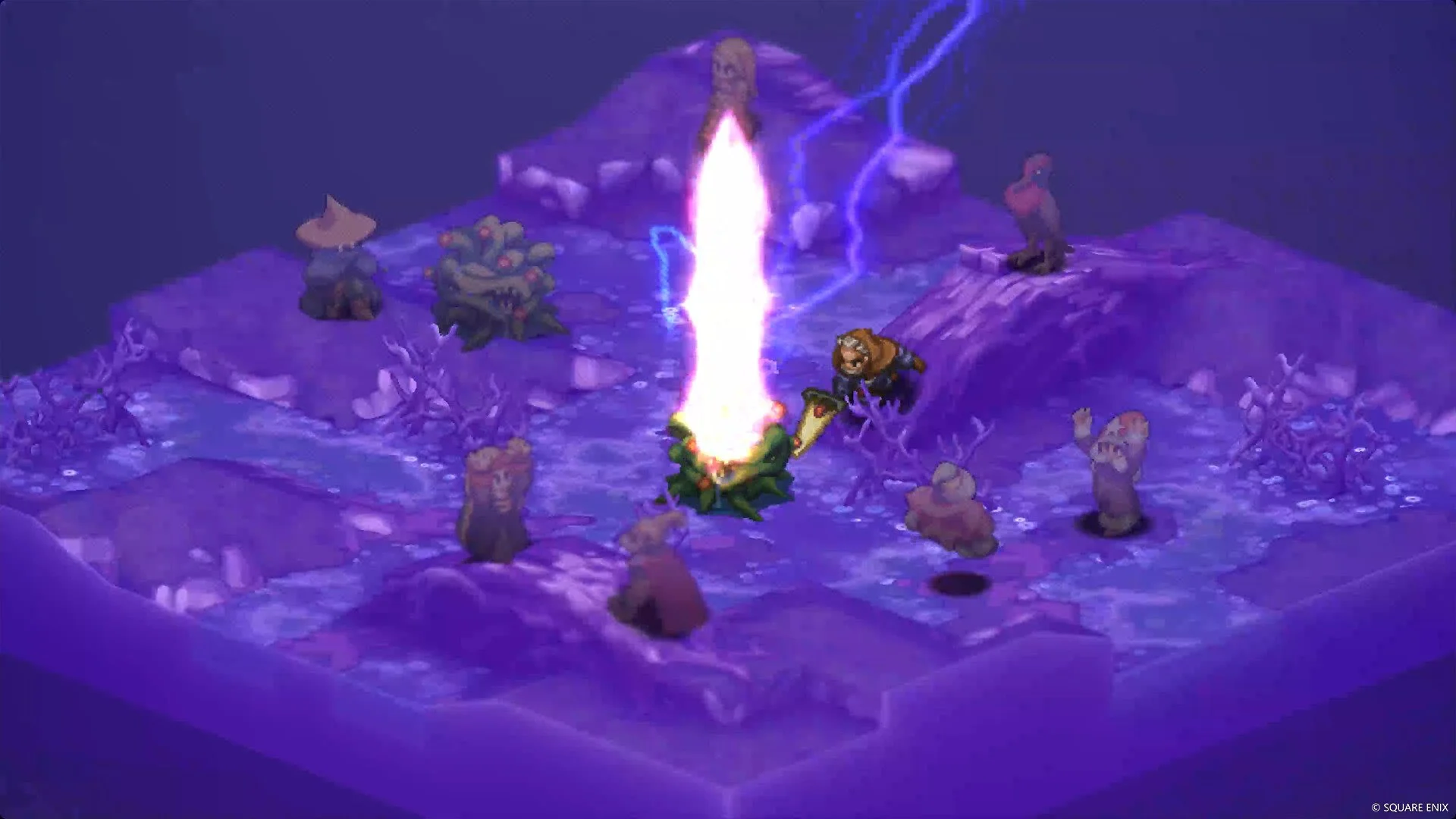A Heretic's History of Final Fantasy Tactics
In the original Japanese release of Final Fantasy Tactics, four artefacts found through Errands unlocked special “choose your own adventure” stories. These were labelled “sound novels” after the genre popularised by Chunsoft’s Otougiriso and Kamaitachi no Yoru. Sadly, they were removed from the English release of the game on PlayStation. Even when the Final Fantasy Tactics script was retranslated for the War of the Lions PSP remake, the English version excluded the sound novels once again.
The Ivalice Chronicles, the upcoming remake directed by Kazutoyo Maehiro (who designed the sound novels in the original) rectifies this wrong. Yet it is not actually the first time that Final Fantasy Tactics’ sound novels became available in English. Between 2003 and 2004, Mark “Tuffy da Bubba” Rosa translated the first three of four sound novels and made them available on his Geocities website. While this online release did not have accessible music, it was possible to download the files for offline use and (per Tuffy) play the original score via a WinAmp plugin.
Of course, this required technical workarounds that some people found annoying. So hackers in the Final Fantasy Tactics community decided to insert these sound novels back into the game. The most thorough of these efforts was 2021’s The Lion War, a larger project to back-port features from the War of the Lions release into the PlayStation original. Among other features, this hack allowed players to access the sound novels as they were originally intended: by unlocking the artefacts via Errands while playing the game.
This is just one example of how Final Fantasy Tactics fans have reshaped the original game for their own needs. With the right program, you can edit nearly everything in the PlayStation version of the game, from stats (FFTPatcher) to graphics (Shishi) and even names (FFTacText) or dialogue (EVSP). Hackers congregate on sites like FFHactics and Romhacking.net to share their projects and critique each other’s work.
While a handful of these projects tell original stories, the majority remix battles, jobs, and stats according to taste. These range in faithfulness from the aforementioned Lion War mod, which keeps balance as is, to the heavy rebalancing present in Cerabow’s Mod and Laggy Fantasy Tactics. Then there are oddball modifications like Celdia’s Complete Patch, which adds new jobs like Green Mage and Homemaker.
Many of these projects also crank up the difficulty. While Final Fantasy Tactics has infamous challenge spikes, its systems are surprisingly easy to exploit. Once you can heal any wound automatically with potions, teach ninjas to punch enemies barehanded, or hit every enemy on the field with math magic, most enemies in the game do not have the skills or tools to stop you.
That’s why one of the most famous (or infamous?) ROM hacks made for the game was Final Fantasy Tactics 1.3, developed by Archael starting in 2008. The hack advertised itself as a balanced, challenging version of the game that gave both you and your opponents more options. In reality it was so unreasonably tough that many in the community rejected it. Still, the hack was influential, and modders followed in its footsteps even as they tweaked elements to fit their own preferences.
Other hacks sought to make the game harder in more unusual ways. Emmy’s 2015 hack Monster Tactics, for instance, prevents the player from hiring human mercenaries. Instead they must recruit monsters from the battlefield. While monsters existed in the original game, Monster Tactics makes them all much more powerful and demands mastering their skillsets just to survive each fight. It’s the Final Fantasy Tactics equivalent of Wizardry IV: The Return of Werdna, but slightly less cruel.
While Final Fantasy Tactics is best remembered for its single player campaign, there is also an active multiplayer community. The Tactics League Discord, for instance, connects players via the emulator PPSSPP to play online. Meanwhile, FFTBattleground transforms the game into a spectator sport, where viewers make bets on the outcome of AI-controlled fights. It’s Final Fantasy Tactics by way of SaltyBet, which sadly reads differently today following the explosive success of sports gambling.
The Ivalice Chronicles is a great opportunity for the game’s various fan communities and has been heralded as such. Its release will attract new players who may never have heard of the original. The PC version could also serve as a new base for modding, depending on its internal workings, not to mention new balance changes and story additions. Some reviewers are already hailing the game as the definitive release.
Yet I can’t help but wonder: considering just how many times that the game has been reinterpreted by its fans, can this new, official release really be said to be definitive? Hacks from 1.3 to Monster Tactics to Cerebow’s Mod each presented their distinct vision for what the game could be. These projects had their own dedicated communities that lasted for years. Their fans, rather than Square Enix, were what kept the original Final Fantasy Tactics alive and relevant through the eighteen year wait following The War of the Lions’ PSP release.
“But these were not real developers,” you might say. “They are the marginalia to the source material’s grand history.” Well, Final Fantasy Tactics is a game about marginalia. The game’s protagonist Ramza Beoulve was a noble hero, and yet was erased by the church; his friend Delita Heiral was a complex figure, and yet his complexities were erased by history. Only the long-hidden Durai Papers reveal the truth of their lives and of the Church’s machinations.
Despite being treated by some fans as a kind of holy text, the original Final Fantasy Tactics is an imperfect game. Its story forsakes politics for supernatural drama. Its battles are either too hard or too easy. You can level up your characters in the early game by having your army stand around in a circle and throw rocks at each other. It is maximalist, ridiculous, overly obscure. The kind of game that lends itself to reassessment and remastering.
It makes perfect sense to me that developers who worked on that original game, like Maehiro, would want to go back and try again. This meant recreating the whole game from scratch, since Square Enix threw out the source code. (Nothing personal: that’s just what was done back in those days.) While I haven’t had the opportunity to check out The Ivalice Chronicles myself, I’m happy to see that critics are happy with it so far. Especially considering that, to this point, Tactics has seen less love from Yasumi Matsuno and his crew than his earlier title Tactics Ogre.
But I’m struck by the fact that, according to a panel at PAX West 2025, Maehiro and his team referenced fan-made databases while developing The Ivalice Chronicles. The fans who made these databases did so solely out of love. They will never be compensated, because the world does not work that way. That’s what it means to be marginalia.
Final Fantasy Tactics is no longer just what its creators made of it. It is a decades-long project of improvisation spearheaded by online obsessives striving to adapt the source material to their liking. Every project becomes its own heretical branch of history powered by devotees spreading the word across forums and social media. Are they not a part of the game’s evolving history, too, as told and retold by professional and amateur historians?
There is no one Final Fantasy Tactics; even The Ivalice Chronicles is merely a new take on an old story. There is only the grid, history’s stage, where game pieces and their related numbers are rearranged by innumerable hands. Some forms are exalted, others buried. But as a great historian once said: “what the eye sees is oftentimes a mere fragment of the truth.”










